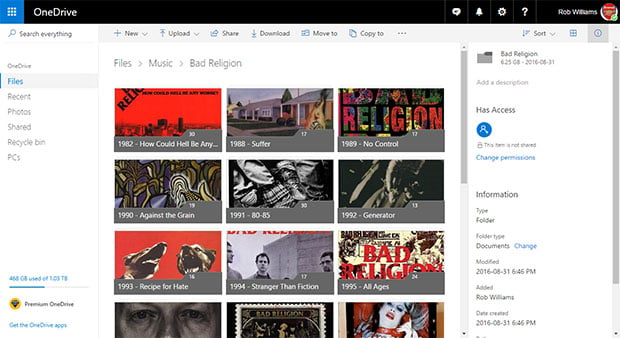Microsoft Patents Pirated Content Prevention And Offender Tracking On OneDrive
Microsoft has just been granted a patent that could help the company to fight back against users that have been taking advantage of its OneDrive cloud storage service to share pirated materials. Now more than ever, users are storing a lot of their data outside of their homes or devices, taking advantage of services like OneDrive, Google Drive and Dropbox to keep that data safe on someone else's servers. That's a great perk in itself, but more than that, these services also allow users to share that data.
Some patent titles are vague, but Microsoft's latest leaves nothing to the imagination: "Disabling prohibited content and identifying repeat offenders in service provider storage systems".
There's a lot that's scary in that meager sentence. This patent represents Microsoft being able to do more than simple scans on your data. OneDrive isn't a box that people simply toss data into - that data is scanned to better understand its content, and thanks to our knowledge of this patent, it will soon expand to detect whether or not the data contains pirated content.
If you're someone who doesn't share pirated materials through OneDrive (or another cloud storage provider, for that matter), this patent wouldn't affect you. What it could mean is that if content is flagged, its share feature would simply be disabled - a quick, effective fix. That's a lot better than having the file outright deleted, because after all, a lot of us store our legitimate music and other content on services like OneDrive for the sake of having offsite backups.

What's most notable about this patent is the fact that Microsoft will track offenders, and after enough hits to the account, it'd be marked. At that point, the account might not be outright closed, but it could have its sharing privileges revoked.
It's worth noting that other cloud providers, like Dropbox and Google Drive, actively monitor for pirated and other prohibited content and take appropriate action when needed. Microsoft's patent goes a bit further to track the offenders and take ultimate action if too many hits are made against the account.
As comprehensive as Microsoft's tools might prove to be, it's hard to imagine that it's a bulletproof solution. If someone was desperate enough to share pirated content, putting it in a simple zip file (especially encrypted) could avoid detection. Even if it's not bulletproof, though, it seems certain that this move could dramatically cut down on the pirated content shared on OneDrive.


